|
|
|
Sort Order |
|
|
|
Items / Page
|
|
|
|
|
|
|
| Srl | Item |
| 1 |
ID:
086440
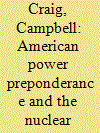

|
|
|
|
|
| Publication |
2009.
|
| Summary/Abstract |
The theory of Power Preponderance put forward by Stephen Brooks and William Wohlforth is poised to replace structural balance-of-power theory as the leading American Realist interpretation of international politics. Power Preponderance argues that would-be rivals to the US are not balancing against it because they are dissuaded from doing so by geopolitical and structural factors, rather than because they love the US or are cowed by it. This article shows why the central analytical claim of Power Preponderance would be substantially enhanced by incorporating the logic of the nuclear revolution, but that its main policy recommendation - indefinite and magnanimous American preponderance - is undermined by the spectre of nuclear war. In the nuclear age, normative solutions to the problem of anarchy invariably gravitate toward the logic of a world state.
|
|
|
|
|
|
|
|
|
|
|
|
|
|
|
|
| 2 |
ID:
138968
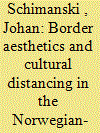

|
|
|
|
|
| Summary/Abstract |
The borderscape is a flexible entity that goes beyond the space of the border and the borderland. This article argues that art and literature can be constitutive elements in the borderscape, along with other kinds of bordering and demarcation. Art and literature can help create resistance through performative acts of “borderscaping”, taking place in different locations and involving different perspectives. The article uses the aesthetic categories of the sublime, the postmodern, and the defamiliarised to trace forms of “distance” or “distancing” as they appear in conceptualisations of the borderscape. Artistic practices in the Norwegian-Russian borderscape are examined in an evaluation of their geopolitical significance, with particular attention given to descriptions of the Norwegian-Russian border in novels by John Fowles and Kjartan Flogstad.
|
|
|
|
|
|
|
|
|
|
|
|
|
|
|
|
| 3 |
ID:
086578
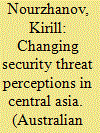

|
|
|
|
|
| Publication |
2009.
|
| Summary/Abstract |
This article discusses the current process of securitisation in Central Asia and identifies its convoluted and faulty nature as a factor impeding collective security action in the region. It uses the Regional Security Complex Theory (RSCT) as an explanatory tool and posits that security discourse in - and about - the five former Soviet republics is dominated by geopolitical grand strategy on the one hand and by particularist concerns about lack of democracy or transnational threats on the other. Issues of conventional security involving two or more states, such as territorial disputes or resource management, are pushed aside and rarely securitised at the official level. The article outlines conceptual and institutional reasons for this bias, and argues that unless inter-state tensions are properly analysed, debated and addressed, the prospects for security and stability in the region will remain grim.
|
|
|
|
|
|
|
|
|
|
|
|
|
|
|
|
| 4 |
ID:
089146
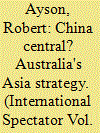

|
|
|
|
|
| Publication |
2009.
|
| Summary/Abstract |
From Australia's perspective, and in spite of the global economic crisis, an increasingly strong China will remain the dominant theme in Asia's evolving distribution of power. Australia has benefited from the prosperity which is the foundation of China's rise. But it continues to value the reassurance that a strong United States can bring to Asia. This favourable status quo seems superior to the alternatives: a cooperative Asian community which may be more aspirational than practicable; an Asian concert which requires an unlikely sharing of leadership between the great powers; or a coalition of Asian democracies which could be especially divisive. But as this comfortable status quo is strained, Australia may need to consider geopolitical options which until now have appeared fanciful and risky.
|
|
|
|
|
|
|
|
|
|
|
|
|
|
|
|
| 5 |
ID:
139595
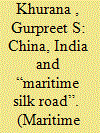

|
|
|
|
|
| Summary/Abstract |
In the coming years, the texture of China–India relations will be a crucial determinant of the geopolitical, economic and security environment of Asia, with a strong impact on the global order. Both countries have lately emerged as major economies. This has led to a dilation of their areas of maritime interest, and thereby a growing China–India interface at sea. This may be accompanied by both opportunities and challenges. Given the dynamism of recent developments, these need to be continually assessed and appraised as inputs for policy making. Among the most significant developments is China's “Maritime Silk Road” (MSR) initiative. In context of this development, this paper attempts to examine the convergences and divergences between China and India. While the bilateral divergences may continue to persist, the paper attempts to assess whether the two countries could capitalize upon the convergences to seize the opportunities presented by the MSR.
|
|
|
|
|
|
|
|
|
|
|
|
|
|
|
|
| 6 |
ID:
141916
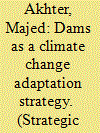

|
|
|
|
|
| Summary/Abstract |
Pakistani planners are increasingly prone to recognize the many links between water, food, and energy security. The construction of new large dams is seen by many as a concrete measure to achieve resource security for Pakistani for a future marked by climactic variability and unpredictability. This article explores the geopolitical and political geographic implications of Pakistan’s strategic vision of building dams as a way to prepare for climate change. The author argues that far from being politically neutral tools for development with predictable effects, large dams create new political and spatial arenas of conflict and contradiction at the international, regional, and local scales.
|
|
|
|
|
|
|
|
|
|
|
|
|
|
|
|
| 7 |
ID:
089444
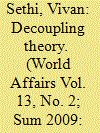

|
|
|
| 8 |
ID:
158663
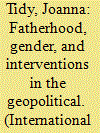

|
|
|
|
|
| Summary/Abstract |
War and peace are gendered and gendering geopolitical processes, constituting particular configurations of masculinity and femininity. When men are considered in relation to war and peace the majority of scholarly accounts focus on soldiers and perpetrators, typically observing their place in the gendered geopolitical solely through military/ized masculinities. In contrast, this article examines fatherhood as a masculine subjectivity, interacting in a nexus with other masculinities to produce an intelligible propeace intervention in war, and considers the implications for our understandings of gender and the geopolitical. To analyze this political subjectivity of what I term “paternal peace,” the article considers the case of Bob Bergdahl. Bergdahl’s son was a US soldier held by a Taliban-aligned group for five years until 2014. During this time Bergdahl was publically critical of US foreign policy, presenting his son’s release as part of a peace process that could end violence in Afghanistan. I unpack how Bergdahl’s public political subjectivity was the outcome of a “gender project” drawing on accounts of “valley” fatherhood in combination with particular forms of diplomatic and military masculinity. I consider how Bergdahl’s intervention was publically received, and how the geopolitical reach of it was pacified within gendered and racialized coding.
|
|
|
|
|
|
|
|
|
|
|
|
|
|
|
|
| 9 |
ID:
142427
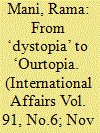

|
|
|
|
|
| Summary/Abstract |
Global governance is in a state of chronic dysfunction. The 70th anniversary of the United Nations offers a timely opportunity to both analyse its disrepair and chart its future through this period of unprecedented upheaval. This article begins with a comparative analysis of two prominent endeavours to redesign global governance in order to address global challenges: the Commission on Global Governance, whose report was launched at the UN's 50th anniversary in 1995; and the Commission on Justice, Security and Governance, which launched its report for the UN's 70th anniversary in June 2015. Despite worthwhile recommendations, both reports suffer from two shortcomings common to such reform efforts. First, pragmatism overrules vision, reducing meaningful global transformation to piecemeal institutional restructuring. Second, the prevailing model of governance, based on nation states and shaped by national interests, remains unquestioned. Such endeavours neither acknowledge nor redress the unfettered pursuit of national interests— geopolitical, economic and military—that caused or failed to prevent today's dystopia of fear and want for most and security for some. The paradigm of global governance needs urgent renewal to equip it to transform this dystopia. This requires two steps. First, looking backwards at the trajectory of philosophical thought on governance and the ideal state, in order to reground global governance in ‘utopian vision’. Second, looking outwards at four unfolding global trends of civics, ethics, physics and metaphysics that are reshaping reality, in order to update global governance to an ‘Ourtopian’ paradigm.
|
|
|
|
|
|
|
|
|
|
|
|
|
|
|
|
| 10 |
ID:
188352
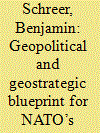

|
|
|
|
|
| Summary/Abstract |
How will the North Atlantic Treaty Organization (NATO) respond to China’s rise? At the heart of NATO’s China challenge is the need for allies to grasp the magnitude of Beijing’s emerging geopolitical challenge to the Euro-Atlantic area. Utilizing geopolitical theories developed by Halford Mackinder and Nicholas Spykman, the article argues that China is evolving into a transatlantic challenge on the Eurasian “maritime periphery.” Consequently, NATO can play a significant role in putting pressure on China’s continental direction and its efforts to extend its strategic reach into the “far seas.”
|
|
|
|
|
|
|
|
|
|
|
|
|
|
|
|
| 11 |
ID:
135186
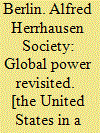

|
|
|
|
|
| Publication |
Berlin, Foresight, 2009.
|
| Description |
51p.Pbk
|
|
|
|
|
|
|
|
|
|
|
|
Copies: C:1/I:0,R:0,Q:0
Circulation
| Accession# | Call# | Current Location | Status | Policy | Location |
| 058016 | 333.0973/BER 058016 | Main | On Shelf | General | |
|
|
|
|
| 12 |
ID:
150530
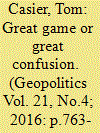

|
|
|
|
|
| Summary/Abstract |
This article explains why a considerable part of the International Relations literature frames highly complex energy relations between the EU and Russia in terms of simple, exclusive geopolitical intentions. Drawing on Construal Level Theory, it addresses the gap between immediate interaction between various private and public actors with their own agendas and individual intentionalities and assumed collective geopolitical intentionalities. Because of the degree of abstraction, collective motivations are attributed to actors like Russia and the EU. This attribution risks to be subject to bias. It is argued that higher psychological distance increases the likelihood of more radical and ideologised framing. These abstract schemes do not follow from the endogenous energy dynamics but are function of a broader logic of competition which has characterised EU-Russia relations.
|
|
|
|
|
|
|
|
|
|
|
|
|
|
|
|
| 13 |
ID:
193027
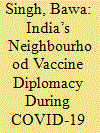

|
|
|
|
|
| Summary/Abstract |
In recent years, India has established itself as the world’s ‘pharmacy hub’, and this claim was proven once again when it delivered COVID-19 vaccines to its citizens, neighbouring nations and across the globe. Following the philosophy of humanitarianism through the principle of ‘Vasudhaiva Kutumbakam’, India has decided to provide the COVID-19 health assistance to its immediate neighbouring countries. India’s immediate neighbourhood refers to the countries that are geographically adjacent to it. In addition, India’s vaccine diplomacy has exposed geopolitical fault lines in South Asia as China’s vaccine diplomacy aims to outpace India in the region. Against this background, the main objective of this paper is to explain and examine India’s vaccine diplomacy as an instrument of its ‘Neighbourhood First’ policy during the COVID-19 pandemic. It argues that India’s health-focused approach has proved effective and aligned with its national interests. This review demonstrates that India’s health diplomacy has had an impact on medical and humanitarian assistance reciprocation at the regional and international levels. As a result of this strategy, during the second wave of the pandemic, India received medical devices and vaccines from other countries in dealing with COVID-19.
|
|
|
|
|
|
|
|
|
|
|
|
|
|
|
|
| 14 |
ID:
140019
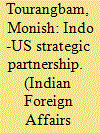

|
|
|
|
|
| Summary/Abstract |
So, at the end, the question really is not ‘who’s afraid of an alliance’, but ‘who needs an alliance’. Given the current geopolitical and geoeconomic dimensions involving India and the USA, Cold War type strict alliances – with clear demarcations about who’s on who’s side, and based on the idea of the existence of an ‘absolute other’ on all vectors of the relationship – may not be how it plays out. Alliances presume a threat perception and, given the nature of India-China, Sino-US, and India-US relations, and the complex interdependence that entwines them, building alliances and counter-alliances may not be the best answer to both India’s and America’s strategic needs. The way to a sustainable and stronger strategic partnership can only be built through a comprehensive and inclusive convergence aimed at progress, and through a single track strategic rationale of a threat from China’s rise. Hence, both sides need not be receptive and protective of all that each side says and does. Having said that, an initiative should not also be discarded just because it is American in origin – especially if it passes the test of interest and operational convergence. Though a constant reminder of what each country has done for the other is not a recipe for a sustainable relationship, a businesslike attitude towards why the two countries need each other, and how both could complement each other in the short, medium and long term, could be a pragmatic perspective on how to go forward together.
|
|
|
|
|
|
|
|
|
|
|
|
|
|
|
|
| 15 |
ID:
170141
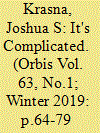

|
|
|
| 16 |
ID:
075838
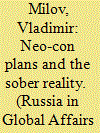

|
|
|
| 17 |
ID:
089332
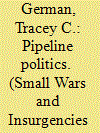

|
|
|
|
|
| Publication |
2009.
|
| Summary/Abstract |
The development of new energy export infrastructure, which bypasses Russia, has constituted a fundamental element of US and European engagement with the Caucasus in recent years, but has, to some extent, undermined Moscow's hegemony in an area that it considers to be its own 'strategic backyard'. This article examines the validity of the argument that Russian military intervention in Georgia in August 2008 was motivated by so-called 'petro-politics' and a desire to punish Tbilisi for its overt pro-Western orientation. It analyses the significance of the pipelines that transit Georgia and their implications for European energy security, together with the potential consequences of the 2008 conflict for future infrastructure developments.
|
|
|
|
|
|
|
|
|
|
|
|
|
|
|
|
| 18 |
ID:
124836
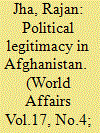

|
|
|
|
|
| Publication |
2013.
|
| Summary/Abstract |
Given the differences between the geographical and socioeconomic basis of the origin of the state in Afghanistan and Europe, it is but obvious that their nature would also differ. The Afghan state directly and indirectly involved various religious institutions, like mosque and Islamic scholars in its day-to-day politics
|
|
|
|
|
|
|
|
|
|
|
|
|
|
|
|
| 19 |
ID:
138045
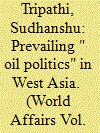

|
|
|
|
|
| Summary/Abstract |
West Asia is currently in the midst of tumultuous changes due to atypical forces that have compelled member-states to maintain alliances with the major powers.
|
|
|
|
|
|
|
|
|
|
|
|
|
|
|
|
| 20 |
ID:
192201
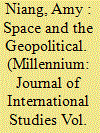

|
|
|
|
|
| Summary/Abstract |
The paper argues that the dominant geopolitical analysis draws from a tradition of thought that privileges a geographical approach to space. The process that extends such impetus most compellingly can be found in security intervention. Interventionism, specifically under the War on Terrorism (WoT) thinking projects a cartography of (in)security and threat that disrupts on the one hand existing dynamics of space production and on another redefines space as geography with violent consequences for a variety of life-forms. The question that guides my endeavor is the following: how does a rethinking of the geographical question in international relations (IR), particularly with regards to intervention and the WoT enable us to expand an understanding of geopolitics beyond power struggles over space? Thinking from the Sahel-Sahara region, I wish to offer an alternative view of space where life, government, intellectual representations, commerce, culture, landscape, and belief lead to different kinds of relationships. This view is meant to suggest the beginning of the sketching of different systems of thought and morals through which to apprehend more productively a notion of space in IR.
|
|
|
|
|
|
|
|
|
|
|
|
|
|
|
|
|
|
|
|
|